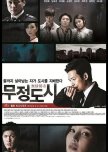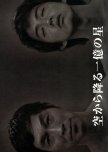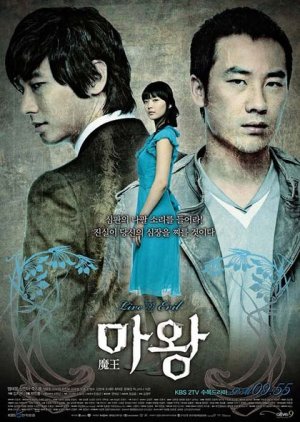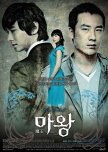
They're both about traumatic pasts and its effect on the main characters. They're both dark and psychologically complex! (love them both)

Ikuta Toma & Ohno Satoshi stars in this dark, mystery & psychological thriller drama. Remake of Korean drama Lucifer/Devil/Mawang stars Joo Ji Hoon. Definitely a must watch if you like this genre.

They are many similarities between the two drama especially due to its theme and its execution. They both focus on revenge and on what exactly is justice and retribution. Also the ambience and the ending are similar.


i haven't watched daisy yet but the synopsis reminds me of each other....
in "the devil" the cop and the "suspect" do fall in love with the main lead in some way shape or form. however, the devil deals with more of the mystery than the romance but how its set up doesn't make you feel like its lacking... the end is a little tragic but the over all show was really good...
i wouldn't recommend this for anyone who doesn't like dark or intense shows because "the devil" has both...
in "the devil" the cop and the "suspect" do fall in love with the main lead in some way shape or form. however, the devil deals with more of the mystery than the romance but how its set up doesn't make you feel like its lacking... the end is a little tragic but the over all show was really good...
i wouldn't recommend this for anyone who doesn't like dark or intense shows because "the devil" has both...


1. **Revenge and Redemption**: Both dramas delve deeply into themes of revenge and redemption. In "Lucifer," the protagonist seeks vengeance for his brother's death, while in "All In," the main character's life is shaped by his quest for revenge and his subsequent journey towards redemption.
2. **Dark and Intense Atmosphere**: Both series have a dark and intense atmosphere, with intricate plots that keep viewers on the edge of their seats. "Lucifer" is more of a psychological thriller, whereas "All In" combines elements of romance and action with its dramatic storyline.
3. **Complex Characters**: The characters in both dramas are multi-dimensional and undergo significant development. They face moral dilemmas and personal struggles that add depth to the narrative.
4. **Tragic Elements**: Tragedy plays a significant role in both dramas. The male protagonists (Lee Byung-Hun and Ju Ji-hoon) experience profound losses and hardships, which drive the story forward and evoke strong emotional responses from the audience.
2. **Dark and Intense Atmosphere**: Both series have a dark and intense atmosphere, with intricate plots that keep viewers on the edge of their seats. "Lucifer" is more of a psychological thriller, whereas "All In" combines elements of romance and action with its dramatic storyline.
3. **Complex Characters**: The characters in both dramas are multi-dimensional and undergo significant development. They face moral dilemmas and personal struggles that add depth to the narrative.
4. **Tragic Elements**: Tragedy plays a significant role in both dramas. The male protagonists (Lee Byung-Hun and Ju Ji-hoon) experience profound losses and hardships, which drive the story forward and evoke strong emotional responses from the audience.

1. **Revenge and Justice**: Both dramas revolve around themes of revenge and justice. In "Lucifer," Ju Ji-hoon’s main character seeks to avenge his brother's death, while in "Time Between Dog and Wolf," Lee Joon Gi’s main character is driven by the desire to avenge his mother's murder.
2. **Complex Characters**: The characters in both dramas are deeply complex and undergo significant development. They face moral dilemmas and personal struggles that add depth to the narrative.
3. **Undercover Operations**: Both series feature protagonists who go undercover to achieve their goals. In "Lucifer," the protagonist uses his legal expertise to manipulate situations, while in "Time Between Dog and Wolf," the main character infiltrates a criminal organization under a new identity.
4. **Psychological and Emotional Depth**: Both dramas delve into the psychological and emotional aspects of their characters, exploring how their past traumas and current missions affect their mental states and relationships.
5. **Action and Suspense**: Both series are filled with action and suspense, keeping viewers on the edge of their seats. The intricate plots and unexpected twists make for a thrilling viewing experience.
2. **Complex Characters**: The characters in both dramas are deeply complex and undergo significant development. They face moral dilemmas and personal struggles that add depth to the narrative.
3. **Undercover Operations**: Both series feature protagonists who go undercover to achieve their goals. In "Lucifer," the protagonist uses his legal expertise to manipulate situations, while in "Time Between Dog and Wolf," the main character infiltrates a criminal organization under a new identity.
4. **Psychological and Emotional Depth**: Both dramas delve into the psychological and emotional aspects of their characters, exploring how their past traumas and current missions affect their mental states and relationships.
5. **Action and Suspense**: Both series are filled with action and suspense, keeping viewers on the edge of their seats. The intricate plots and unexpected twists make for a thrilling viewing experience.

Both leads (the protagonist in NiF, the antagonist in Devil) use their enemy's dirty secrets and past deeds as their weapon to bring said enemy down while not actually doing anything besides setting the stage, thus not dirtying their own hand directly.
Only in The Devil the lead did what he did for pure revenge, while in NiF the lead did it to clean his family's name.
Only in The Devil the lead did what he did for pure revenge, while in NiF the lead did it to clean his family's name.





I would bet good money that Kim Ji Woo watched "One Million Stars" before writing "The Devil". There are numerous parallels between the plots, characters and themes as both shows explore issues of moral culpability and the lasting impact of violence. There are significant differences as well, and it's fascinating to watch how the shows diverge despite starting with similar premises.






























